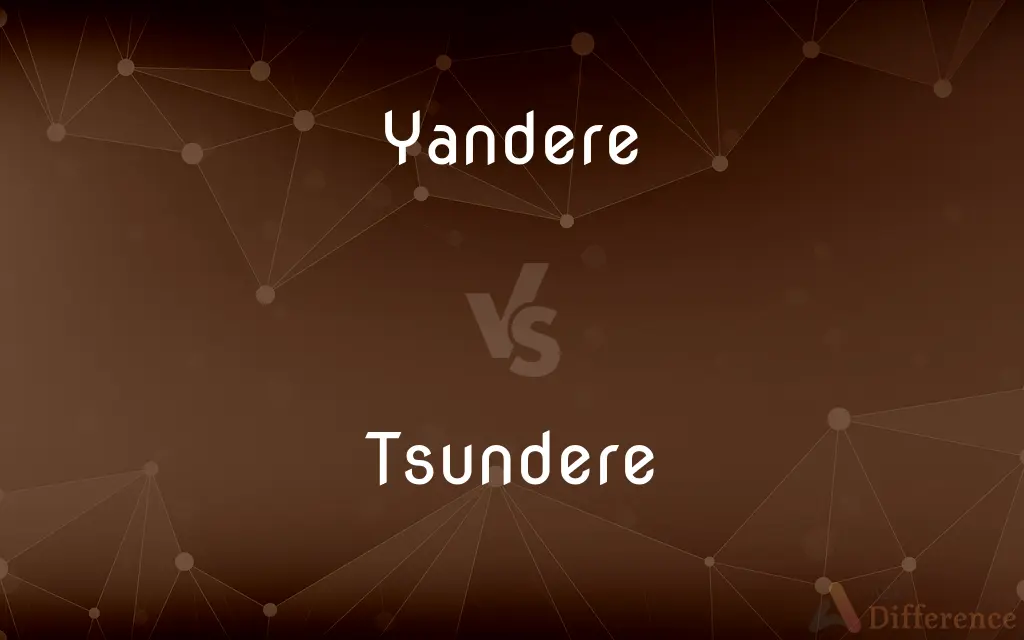Yandere vs. Tsundere — What's the Difference?
By Fiza Rafique & Maham Liaqat — Updated on April 7, 2024
Yandere characters exhibit obsessive and often violent behaviors driven by love, whereas Tsunderes alternate between cold and warm attitudes due to their conflicting feelings.

Difference Between Yandere and Tsundere
Table of Contents
ADVERTISEMENT
Key Differences
Yandere characters are known for their extreme attachment to the object of their affection, often resorting to violence to eliminate perceived threats to their relationship. They present a loving and gentle facade to their beloved while hiding their darker, more possessive traits. On the other hand, Tsundere characters initially display a cold, hostile attitude towards their love interest or others, which gradually warms up to show a softer, caring side as their true feelings become more apparent.
While Yanderes are typically motivated by a deep-seated fear of abandonment or betrayal, leading them to extreme measures to ensure their love is unchallenged, Tsunderes' behaviors stem from a struggle to reconcile their feelings with their pride or fear of vulnerability, causing them to oscillate between harshness and affection.
The portrayal of Yandere characters often delves into psychological horror, emphasizing the terrifying lengths they will go to for love, including manipulation, stalking, and even murder. Tsunderes, conversely, are usually featured in more comedic or romantic contexts, where their mood swings add to the dynamic tension of developing relationships without crossing into violence.
The concept of the Yandere is rooted in a dark, obsessive love that disregards moral boundaries for the sake of possessiveness, contrasting sharply with the Tsundere archetype, which is based on the comedic and dramatic potential of fluctuating emotions and the eventual heartfelt acceptance of love.
Yandere characters challenge the boundaries of conventional romantic affection, turning love into an obsession that justifies any action, no matter how extreme. Tsundere characters, while also complex, navigate their internal conflicts and vulnerabilities in a manner that typically leads to growth and deeper emotional connections without resorting to violence.
ADVERTISEMENT
Comparison Chart
Definition
Characters who are obsessively in love, willing to use violence.
Characters who alternate between cold (tsun tsun) and warm (dere dere) attitudes.
Behavior Origin
Driven by obsessive love and fear of abandonment.
Stem from conflicting feelings and pride, causing mood swings.
Typical Expression
Violent actions and manipulation to eliminate romantic rivals.
Cold hostility that warms up over time as they become more comfortable with their feelings.
Context in Stories
Often appear in psychological thrillers or horror genres.
Common in romantic comedies or dramas.
Emotional Dynamics
Extreme possessiveness and willingness to do anything for love.
A struggle between affection and pride, leading to personal growth.
Compare with Definitions
Yandere
Violence as Proof of Love.
A Yandere could harm those they perceive as threats to their relationship.
Tsundere
Pride and Vulnerability.
Tsunderes often hide their true feelings behind a facade of indifference or hostility.
Yandere
Facade of Gentleness.
Yanderes often appear exceptionally kind and loving to the object of their affection.
Tsundere
Cold Outside, Warm Inside.
A Tsundere might initially rebuff attempts at closeness but gradually opens up.
Yandere
Obsessive Love.
A Yandere might secretly follow their love interest, ensuring they are protected from others' advances.
Tsundere
Growth Through Love.
Tsunderes typically undergo personal growth as they reconcile their feelings.
Yandere
Jealousy and Possessiveness.
A Yandere experiences extreme jealousy and acts possessively towards their partner.
Tsundere
Humorous Misunderstandings.
The cold demeanor of a Tsundere often leads to comedic misunderstandings.
Yandere
Fear of Abandonment.
A Yandere's actions are fueled by a deep fear of losing their loved one.
Tsundere
Mood Swings.
A Tsundere's attitude towards the same person can vary significantly, from cold to warm.
Yandere
A character, usually a girl, who has an obsessive and possessive side in regards to their crush, ready to use violent and murderous means to maintain an exclusive bond.
Tsundere
Tsundere (ツンデレ, pronounced [tsɯ̥ndeɾe]) is a Japanese term for a character development process that depicts a character with a personality who is initially cold, stern, stoic, harsh, temperamental, hotheaded (and sometimes even hostile) before gradually showing a warmer, friendlier side over time. The word is derived from the terms tsun tsun (ツンツン) ('to turn away in disgust or anger') and dere dere (デレデレ) ('to become affectionate').
Tsundere
A cold, nitpicky character, usually a girl, who conceals (without complete success) a bashfulness in the presence of their crush.
Tsundere
Showing qualities typical of a tsundere.
Common Curiosities
Are Yandere characters dangerous?
In fiction, Yanderes are often portrayed as dangerous due to their extreme actions and lack of moral boundaries in pursuit of love.
What's the appeal of Tsundere characters?
Tsunderes are popular for their dynamic character development and the tension their mood swings add to relationships.
Can a Yandere change their ways?
Story arcs involving Yanderes sometimes explore themes of redemption and healing, though their core traits are challenging to overcome.
Can Yanderes be in non-romantic relationships?
While Yanderes are primarily focused on romantic interests, their obsessive traits can sometimes extend to platonic relationships.
Is being Tsundere a defense mechanism?
Yes, the Tsundere's behavior can be seen as a defense mechanism to protect themselves from getting hurt emotionally.
What defines a Yandere?
A Yandere is characterized by obsessive love and a willingness to resort to violence to ensure the object of their affection remains theirs alone.
How do Tsunderes behave?
Tsunderes exhibit a cold demeanor that eventually warms up, reflecting their internal conflict between affection and pride.
Do Tsunderes always end up with their love interest?
In many stories, Tsunderes' evolving feelings and personal growth often lead to a positive resolution with their love interest.
Do all Tsunderes start off hostile?
Most Tsunderes exhibit initial hostility or indifference, which gradually softens as the story progresses.
Why are Yanderes often in horror stories?
Yanderes fit well into horror narratives due to their extreme behaviors and the psychological tension they create.
What triggers a Yandere's obsessive behavior?
Yanderes' behavior is often triggered by intense love combined with fear of abandonment or jealousy.
How do Tsunderes contribute to a story's humor?
Tsunderes add humor through their overreactions, denial of feelings, and the resulting misunderstandings.
Are Tsundere relationships healthy?
Tsundere relationships can evolve into healthy dynamics as the character grows and learns to express their feelings positively.
Do Yanderes recognize their own behavior as problematic?
In fiction, Yanderes may not fully recognize or admit the problematic nature of their actions, focusing instead on their intense emotions and goals.
Can Yanderes feel genuine love?
While Yanderes feel intense love, their expression of it is unhealthy and obsessive, often overshadowing the genuine affection underneath.
Share Your Discovery

Previous Comparison
Dust vs. Clay
Next Comparison
Mono vs. LogoAuthor Spotlight
Written by
Fiza RafiqueFiza Rafique is a skilled content writer at AskDifference.com, where she meticulously refines and enhances written pieces. Drawing from her vast editorial expertise, Fiza ensures clarity, accuracy, and precision in every article. Passionate about language, she continually seeks to elevate the quality of content for readers worldwide.
Co-written by
Maham Liaqat















































